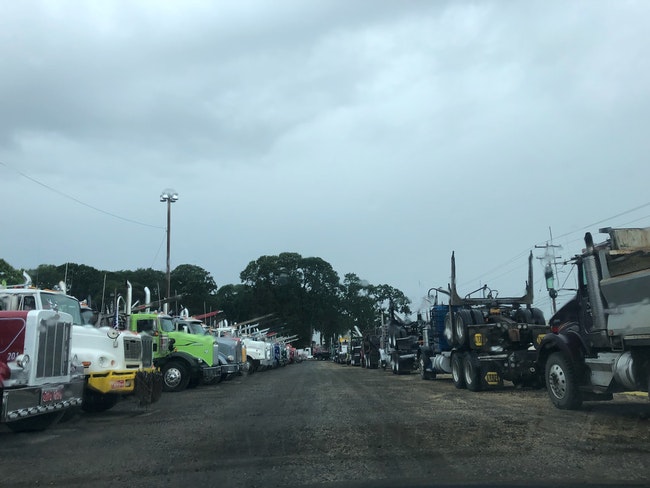
New Clean Trucks Rules are expected to cut in half greenhouse gas emissions and tailpipe pollution during the next decade. (Salem Reporter)
A powerful state regulatory commission Wednesday put Oregon in the forefront of climate change efforts by mandating changes to trucking that are expected to cut in half greenhouse gas emissions and tailpipe pollution.
The state Environmental Quality Commission approved the Clean Trucks Rules to require truck manufacturers to boost their production of electric medium- and heavy-duty trucks sold in Oregon, and require new medium- and heavy-duty diesel vehicles sold in Oregon to emit less smog.
Oregon is the second state to adopt such rules, after California.
Ali Mirzakhalili, an air quality administrator at the state Department of Environmental Quality said during the meeting that these are “two of the most significant rules to reduce truck tailpipe emissions in Oregon.”
The DEQ had recommended the commission adopt the rules to advance clean-energy transport and reduce the state’s overall emissions from transportation, noting it is the largest source of greenhouse gas emissions in Oregon.
The truck and engine manufacturing industry has been largely opposed to the rules in Oregon because of the timeline, because it makes Oregon exceptional to standards in most other states, and because of concerns about inadequate facilities for charging electric vehicles. The industry had hoped the state would wait for the federal Environmental Protection Agency to act first on national standards.
DEQ administrators at the meeting Wednesday disagreed with waiting for federal rules, saying air pollution was an urgent equity issue in the state. They noted that people of color are disproportionately living in areas affected by smog and pollution from truck, bearing a larger share of the health risks.
The Oregon Clean Trucks rules mirror ones adopted in California last year. The rule will take effect in 2024, giving manufacturers and sellers time to adjust. They apply to truck models built in 2025 and after.
The first rule requires up to half of new medium- and heavy-duty trucks, buses and vans sold in Oregon by 2030 have no emissions, and up to 75% of them be electric by 2035. The rule is only for the manufacture of the vehicles, however, they do not require anyone to buy them.
The new standards apply to big trucks, tractor- trailer trucks, buses and vans sold in the state, including everything from a Ford F250 to an Amazon delivery truck. However, transit buses will be exempt from the diesel engine rules and emergency vehicles are exempt.
The second rule requires all new heavy duty diesel vehicles sold in Oregon to meet new emissions standards. They will need to emit 75% less smog than they do now beginning in 2025, and 90% less smog by 2027.
Adopting both rules could cut state greenhouse gas emissions from transportation by 55% in Oregon, according to a report from environmental consulting firm M.J. Bradley & Associates. The report was commissioned by the Natural Resources Defense Council and the Union of Concerned Scientists.
The Environmental Quality Commission is a governor-appointed panel of five people that make decisions for the state’s Department of Environmental Quality, which will enforce the rules. Current members are Kathleen George of the Grande Ronde Tribe, Sam Baraso, manager of Portland’s Clean Energy Fund, and Molly Kile, a professor at Oregon State University.
Two positions on the commission are vacant, meaning all three members needed to approve the new rules for them to pass.
Over 540 comments were submitted to the commission in support of the rules, 70 were submitted that opposed the rules.
North America’s largest heavy-duty truck manufacturer, Daimler, had opposed the rules and filed comments against the plan with the Environmental Quality Commission and DEQ. They also joined the Truck and Engine Manufacturers Association in writing to Gov. Kate Brown with their concerns.
Sean Waters is vice president of product compliance at Daimler, which has truck manufacturing operations in Oregon. His job will be to make sure the company meets Oregon’s new standards in Oregon. In an interview with the Capital Chronicle last week, he said the first rule, to manufacture more electric vehicles, suffers from several problems.
One, is infrastructure. Oregon has only one large, public charging station for electric semi-trucks and Daimler built it on Swan Island in an industrial area of Portland, he said.
“It took two years to build, and these rules go into effect in 2024,” Waters said.
Another shortcoming, he said, is that Oregon isn’t as far along as California in establishing the detailed and often complicated rules and policies that would complement the Clean Trucks Rules.
He said California matched its new truck rules with incentives. California required that by 2024, half of new trucks bought by public agencies would have to be electric. He said California already has provided incentives for hybrids and zero-emissions vehicles. It’s driven down their cost by an average of 20%, according to the California Air Resources Board.
“The Clean Trucks Rule, in concept, aligns with our company,” Waters said. “The rule by itself, without those other policy measures, doesn’t mean we can sell them.”
He also said the mandate to manufacture more electric vehicles sold to Oregon doesn’t drive the price down, because there are so few vehicles registered in the state.
“We’ll sell as many as we can, but even if manufacturers meet numbers required by the rule, it’s not going to drive the price down,” he said.
He said Daimler expected to build only all-electric trucks one day, and agrees with the state commission that the state policy was inevitable, if inconveniently timed for car manufacturers.
“We agree with the problems, global warming, emissions,” he said. “We agree on the need for this technology. We have to be successful with zero emission vehicles.”
Oregon Capital Chronicle is part of States Newsroom, a network of news bureaus supported by grants and a coalition of donors as a 501c(3) public charity. Oregon Capital Chronicle maintains editorial independence. Contact Editor Les Zaitz for questions: [email protected]. Follow Oregon Capital Chronicle on Facebook and Twitter.
NEWS TIP? Please send an email to [email protected] for our reporters to consider.




